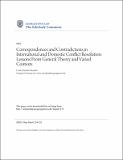|
Reseña:
|
Does the field of conflict resolution have any broadly applicable theories that work across the different domains of international and domestic conflict? Or, are contexts, participants, and resources so domain specific and variable that only thick descriptions of particular contexts will do? These are important questions which have been plaguing me in this depressing time for conflict resolution professionals, from September 11,2001 (9/11), to the war against Iraq. Have we learned anything about conflict resolution that really does improve our ability to describe, predict, and act to reduce unnecessary and harmful conflict? These are the questions I want to explore in this essay, all the while knowing that I will ask more questions than I have answers to. My hope is to spark more rigorous attention to the possibility of comparative dispute resolution study and practice, using key concepts, theories, empirical studies, practical wisdom, and experiential insights to spark and encourage more multi-level and multi-unit analysis of some of our shared propositions.
Reseña: Does the field of conflict resolution have any broadly applicable theories that "work" across the different domains of international and domestic conflict? Or, are contexts, participants, and resources so "domain" specific and variable that only "thick descriptions" of particular contexts will do? These are important questions which have been plaguing me in this depressing time for conflict resolution professionals, from September 11,2001 (9/11), to the war against Iraq. Have we learned anything about conflict resolution that really does improve our ability to describe, predict, and act to reduce unnecessary and harmful conflict? These are the questions I want to explore in this essay, all the while knowing that I will ask more questions than I have answers to. My hope is to spark more rigorous attention to the possibility of "comparative dispute resolution" study and practice, using key concepts, theories, empirical studies, practical wisdom, and experiential insights to spark and encourage more "multi-level" and multi-unit analysis of some of our "shared" propositions.
|

